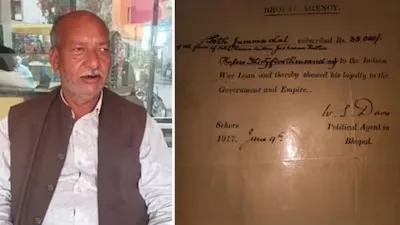Ajit Doval is probably the ultimate example of what a National Security Advisor should be like. Men of his mould and calibre perhaps happen to come along just once, leaving an indelible impact on the life of contemporary India
Cynics and sceptics alike might rightly say that no one is indispensable. But Ajit Doval ‘s extraordinary array of skills, talent, acumen and brilliance, have elevated him to a position beyond perfection.
Born on January 20, 1945, in Pauri Garhwal, in Utarrakhand, it would be well to take a closer look at what the man has been able to achieve in 10 years of his tenure as the National Security Advisor to the Government of India, under Prime Minister Narendra Modii’s leadership, and perhaps end once and all any debate on his indispensability.
But why go that far back in time? The events that unfolded during Operation Sindoor on May 7 should be enough of a testimony to dispel any doubt on the subject.
In just 23 minutes devastating moments, the world saw the emergence of a new India in an avenging avatar post the Pahalgam terror attack that claimed the lives of 26 tourists. Not only that. In those 23 minutes, A substantially shattered Pakistan was down on its knees begging for a ceasefire.
Radical shift in doctrine
The radical shift in India’s military doctrine from defensive tolerance and restraint to one of immediate retaliatory action, with its calibrated response and precision strikes, left the world in shock and awe. But this shift was set in motion with the Uri and Balakot strikes, deep within Pakistan.
Most certainly, the Indian Prime Minister must be given full credit for his bold and resolute leadership by publicly declaring that India would give a befitting reply at the appropriate time,
But somewhere along the way, the role of National Security Advisor Ajit Doval is considered no less important.
With his quiet meticulous ways, far-sighted strategic thinking and tactical brilliance, he has been able to influence with telling effect, the trajectory of India’s political leadership.
What is even more remarkable is that before Doval took over the reins as the fifth NSA, hardly anyone knew or had heard about RAW, either in India or abroad.
Today both names – RAW and Doval – spread dread in the hearts of India’s adversaries, especially across the border. But awe, respect and reverence among allies and friends on the global stage.
Some outstanding achievements
Among all of his many outstanding achievements what stands out are the way he worked as an undercover in the days leading up to Operation Black Thunder in 1988 to flush out Sikh militants inside the Golden Temple. There in disguise, he gained the confidence of the militants and was able to learn of their impending plans.
The information he gleaned from them proved vital for the security forces, who were able effect a total surrender without any loss of lives on either side.
He was able to end insurgency in the North-East and neutraliise the threat posed by the Mizo National Front. He was posted in Mizoram during the insurgency movement by Mizo National Front (MNF). During this movement, he stayed in Burma and China in disguise and mingled with the Mizo National Army to grab their secrets. His tasks eradicated terrorism in Mizoram.
He served as an undercover agent to IB in Pakistan for 7 years. This fetched him the title “Indian James Bond”.
He also played a role during the merger of Sikkim as a state of India.
In the 1999 Indian Airlines Aircraft-IC 814 Hijack incident, he was the one who negotiated with the terrorists to release the passengers.
Almost 15 hijack incidents have been averted because of Ajit Doval between 1971 and 1999.
In the 1990s, he persuaded Kashmiri militant Kuka Purray, to become a counter-insurgent against the militants of Kashmir.
In 2014, over 40 Indian nurses held captive by the ISIS, were freed by the diplomacy of Ajit Doval.
Some likely choices
The choice of a new incumbent top replace Doval will be a tough one. He was appointed by Prime Minister Modi in 2014 as the fifth NSA and during his 10-year tenure, the changes that soon began to sweep over India’s political and security landscape have been staggering, to say the least.
-
Ajit Doval joined IPS in 1968 in Kerala Cadre. In 1974, he received the Police Medal for his services as an IPS
-
He received it at an age of 27, which makes him the youngest to receive the Police Medal till date
Of the top officials, who have been active in the last five years—one name that figures prominently as a probable successor includes former R&AW and National Technological Research Organization (NTRO) chief Anil Dhasmana, who like Doval, belongs to Uttarakhand.
He has worked in multiple vital and important positions, including in Western countries during his tenure in R&AW and holds expertise in Pakistan and related issues.
Similar is the case with present Intelligence Bureau chief, Tapan Deka who has been involved in successful operations that have been closely monitored by the PM himself.
Ajit Doval joined IPS in 1968 in Kerala Cadre. In 1974, he received the Police Medal for his services as an IPS. He received it at an age of 27, which makes him the youngest to receive the Police Medal till date.
He is the 7th recipient of Kirthi Chakra and the 1st Police Officer to receive the prestigious award. It is the second highest peacetime military decoration award awarded by India.
His father also served the nation, who was an officer in the Indian Army. This made Ajit Doval pursue his schooling at King George’s Royal Indian Military School in Ajmer.
Concept of National Security
The concept of National Security Advisor came in India in 1998 when Atal Bihari Vajpayi was the prime minister. Brajesh Mishra, who retired from Indian Foreign Services was appointed the first National Security Adviser of India.
The National Security Adviser (NSA) is the chief executive of the National Security Council (NSC) of the nation, and the primary adviser to the Prime Minister of India on national and international security.
It is the National Security Adviser to whom intelligence agencies such as the Research and Analysis Wing and Intelligence Bureau report, rather than directly to the prime minister.
Most of the NSAs appointed since the inception of the post in 1998 have belonged to the Indian Foreign Service except M K Narayana, in UPA 2 government and his incumbent, Ajit Doval, the present NSA who belong to the Indian Police Service.
The list of NSAs since inception of the post are:
- Brijesh Kumar Mishra, Nov 1998 to May 2004
- 2. JN Dixit, May 2004 to Jan 2005
- M K Narayan, Jan 2004 to Jan 2010
- Shiv Shankar Menon Jan 2010 to May 2014
- Ajit Doval, May 2014 – (incumbent).
DISCLAIMER: The views and opinions expressed in this article are solely those of the author and do not necessarily reflect the official policy or position of Pravasi Samwad. Pravasi Samwad is not responsible for the accuracy, completeness, or reliability of any information presented.








